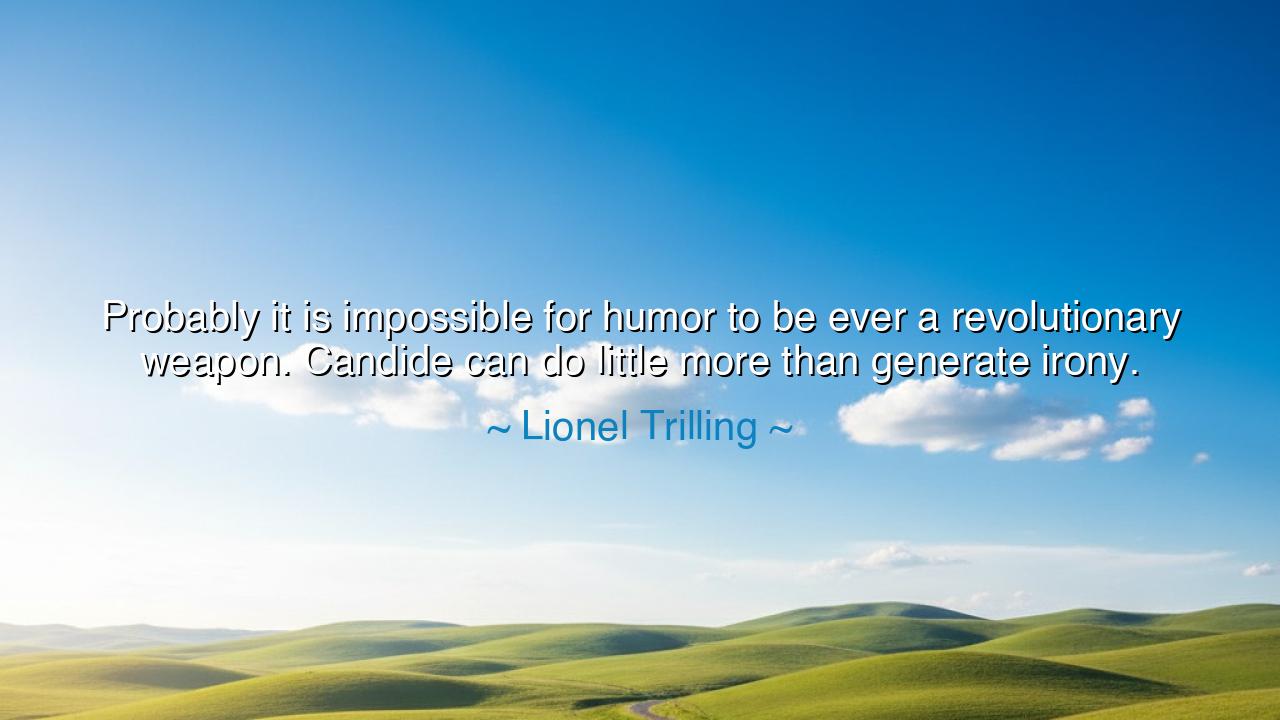
Probably it is impossible for humor to be ever a revolutionary
Probably it is impossible for humor to be ever a revolutionary weapon. Candide can do little more than generate irony.






In the profound words of Lionel Trilling, the literary sage of the twentieth century, we encounter a truth both subtle and sorrowful: “Probably it is impossible for humor to be ever a revolutionary weapon. Candide can do little more than generate irony.” At first, these words may seem like a lament — a quiet sigh from a scholar weary of illusion — yet beneath them lies an ancient insight into the limits of laughter and the quiet impotence of wit before the great machinery of human suffering. For Trilling reminds us that while humor may expose folly, it seldom transforms it; while it may awaken the mind to truth, it rarely compels the heart to act.
To understand this wisdom, we must first recall the origin of Candide, the immortal satire written by Voltaire in the age of Enlightenment. In that tale, the innocent Candide journeys through a world of war, cruelty, and hypocrisy, guided by a teacher who insists that “all is for the best in the best of all possible worlds.” Voltaire, with his wit sharp as a blade and his irony bright as lightning, tore through the false optimism of his time. Yet as Trilling observes, for all its brilliance, Candide did not start revolutions; it did not overthrow tyrants or end war. It made people laugh, yes — but it also made them shrug. Irony, for all its elegance, leaves the world largely intact.
The ancients knew this paradox well. The Greek playwright Aristophanes used comedy to mock the corruption of Athens, to ridicule war, to expose the arrogance of power. His plays stirred laughter across the agora, and yet, when the laughter faded, the city remained unchanged. For laughter, though sharp, is also fleeting; it dissolves tension, but not tyranny. A joke can pierce the armor of pride, but it cannot rebuild the soul of a nation. Thus Trilling, like the philosophers before him, teaches that humor is illumination without flame — it reveals, but it does not burn; it warns, but it does not transform.
Yet this is not to dismiss humor as weak or worthless. There is great nobility in laughter, even if it cannot overturn empires. It keeps the heart from despair, the mind from fanaticism. Humor is the guardian of sanity, the humble shield of those who endure what they cannot change. When the tyrant rules and the world lies broken, the ability to laugh becomes a quiet form of freedom. The prisoner who jokes in his cell, the soldier who smiles in the mud, the poet who mocks his oppressors — all practice a subtle form of rebellion, not by destroying the world, but by refusing to be destroyed by it.
Think of Charlie Chaplin, who through his film The Great Dictator used laughter to unmask the absurdity of tyranny. His humor reached millions, and yet — as Trilling might remind us — it did not stop the war, it did not dismantle the regimes he mocked. The laughter it inspired was real, but it was also helpless. It stirred awareness, but not uprising. For laughter, by its nature, diffuses anger — and revolution is born not of irony, but of fire. Thus, the very gentleness that makes humor humane also makes it unarmed. It enlightens the mind but does not rouse the hand.
Still, one might ask: if humor cannot change the world, is it then useless? No — for not all victories are visible, and not all wars are fought in the streets. Laughter keeps truth alive in dark times; it preserves dignity where despair would otherwise reign. It may not ignite revolutions, but it sustains the spirit of those who wait for one. Trilling’s insight is not cynicism — it is caution. He warns us that laughter alone is not enough, that irony without action becomes complicity. He urges us to move from knowing to doing, from recognizing absurdity to resisting it.
Therefore, let this be the lesson: use humor as the lamp, but not as the sword. Let laughter open your eyes, but let courage move your hands. Irony is the whisper that reveals falsehood; revolution is the cry that casts it down. The wise do not confuse the two. Laugh, yes — but after laughter, stand. After Candide’s smile, comes the labor of building a better world.
In the end, Lionel Trilling’s words are a meditation on the balance between wit and will. He reminds us that the mind alone cannot redeem the world; only the heart in action can. Yet he also honors humor’s quiet sanctity — that even when powerless to change the order of things, it changes the soul that beholds them. Thus, laughter may not be a revolutionary weapon, but it remains a revolutionary light — a small, steadfast flame that keeps humanity awake, even in the longest night.






AAdministratorAdministrator
Welcome, honored guests. Please leave a comment, we will respond soon